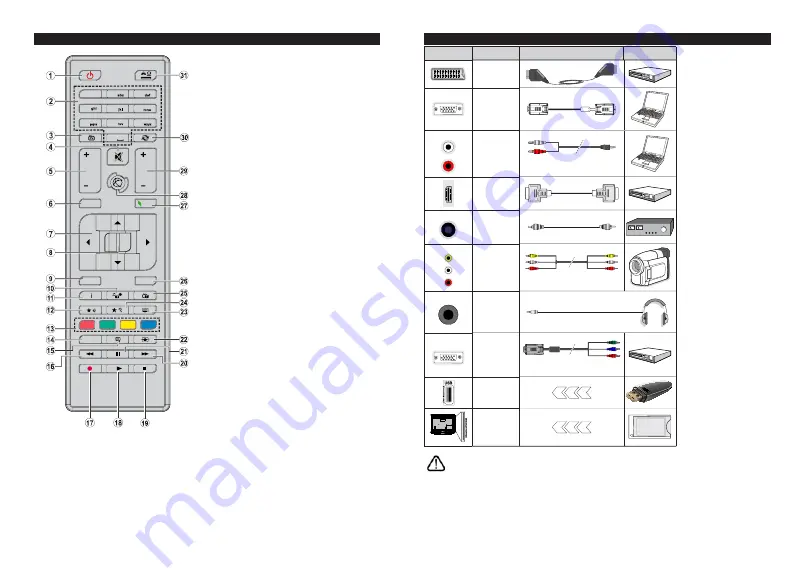
English
- 35 -
Remote Control
(*) MY BUTTON 1 & MY BUTTON 2:
These buttons may have default functions depending on the
model. However you can set a special function to these buttons
E\SUHVVLQJRQWKHPIRU¿YHVHFRQGVZKHQRQDGHVLUHGVRXUFH
RUFKDQQHO$FRQ¿UPDWLRQPHVVDJHZLOOEHGLVSOD\HGRQWKH
screen. Now the selected MY BUTTON is associated with
the selected function.
Note that if you perform
First Time Installation
, MY BUTTON
1&2 will return to their default function.
1.
Standby:
Switches On / Off the TV
2.
Numeric buttons:
Switches the channel, enters a
number or a letter in the text box on the screen.
3.
TV:
Displays channel list / Switches to TV Source
4.
Mute:
Completely turns off the volume of the TV
5.
/-
6.
Menu:
Displays TV menu
7.
Directional buttons:
Helps navigate menus, content
etc. and displays the subpages in TXT mode when
pressed Right or Left
8.
OK:
&RQ¿UPVXVHUVHOHFWLRQVKROGVWKHSDJHLQ7;7
mode), views channel list (DTV mode)
9.
Back/Return:
Returns to previous screen, opens index
page (in TXT mode)
10. Media browser:
Opens the media browsing screen
11. Info:
Displays information about on-screen content,
shows hidden information (reveal - in TXT mode)
12. My button 1 (*)
13. Coloured Buttons:
Follow the on-screen instructions
for coloured button functions
14. Language:
Switches between sound modes (analogue
TV), displays and changes audio/subtitle language
(digital TV, where available)
15. Subtitles:
Turns subtitles on and off (where available)
16. Rapid reverse:
Moves frames backwards in media
such as movies
17.
No function
18. Play:
Starts to play selected media
19. Stop:
Stops the media being played
20. Rapid advance:
Moves frames forward in media such
as movies
21. Pause:
Pauses the media being played
22. Screen:
Changes the aspect ratio of the screen
23. Text:
Displays teletext (where available), press again
to superimpose the teletext over a normal broadcast
picture (mix)
24. My button 2 (*)
25. EPG (Electronic programme guide):
Displays the
electronic programme guide
26. Exit:
Closes and exits from displayed menus or returns
to previous screen
27. Quick Menu:
Displays a list of menus for quick access
28.
No function
29. Pro/-
30. Swap:
Quickly cycles between previous and current
channels or sources
31. Source:
Shows all available broadcast and content
sources
English
- 36 -
Connections
Connector
Type
Cables
Device
Scart
Connection
(back)
VGA
Connection
(back)
SIDE AV
PC/YPbPr
Audio
Connection
(side)
YPbPr/PC Audio Cable
HDMI
Connection
(back)
SPDIF
SPDIF
(Coaxial Out)
Connection
(back)
SIDE AV
Side AV
(Audio/Video)
Connection
(side)
AV Cable
HEADPHONE
Headphone
Connection
(side)
PC to YPBPR
YPbPr Video
Connection
(back)
PC to YPbPr Connection Cable
USB
Connection
(side)
CI
Connection
(side)
CAM
module
NOTE: When connecting a
device via the YPbPr or Side
AV input, you must use the
connection cables to enable
connection.
See the illustrations
on the left side. You can use
YPbPr to VGA cable to enable
YPbPr signal via VGA input.
You cannot use VGA and YPbPr
at the same time. To enable
PC/YPbPr audio, you will need
to use the side audio inputs
with a YPbPr/PC audio cable
for audio connection. If an
external device is connected via
the SCART socket, the TV will
automatically switch to AV mode.|
When receiving DTV channels
(Mpeg4 H.264) or while in Media
Browser mode, output will not be
available via the scart socket.
When using the wall mounting
kit (available from third party
in the market, if not supplied),
we recommend that you plug all
your cables into the back of the
TV before mounting on the wall.
Insert or remove the CI module
only when the TV is SWITCHED
OFF. You should refer to the
module instruction manual for
details of the settings. The/Each
USB input of your TV supports
devices up to 500mA. Connecting
devices that have current value
above 500mA may damage your
TV. By connecting an HDMI cable
to your TV, you have to use only a
shielded HDMI cable to guarantee
a sufficient immunity against
parasitic frequency radiation.
If you want to connect a device to the TV, make sure that both the TV and the device are turned off before making
any connection. After the connection is done, you can turn on the units and use them.






























